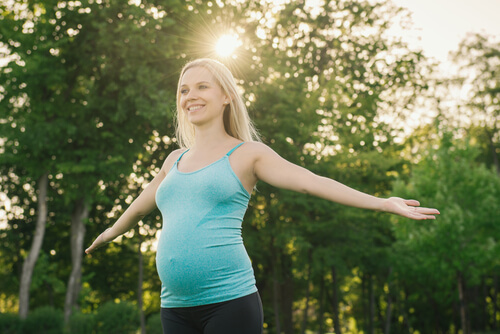How Your Body Changes During Pregnancy

You do a pregnancy test, and it comes out positive. Wonderful news! You are carrying a beautiful new life in your womb. But with this happy result come a million different questions. What will happen to my body? What should I eat? There is no doubt about it: a woman’s body goes through drastic changes during pregnancy.
This is one of the most common worries for women when they find out they are pregnant. Your body changes during pregnancy, and even after your baby is born.
For many women, pregnancy is a beautiful thing. During this stage, the female body adapts itself in order to sustain and care for a new life.
It is truly impressive to think about how new life can emerge from our own reproductive cells. More incredible still is the process by which this cluster of cells becomes a fully-formed human being.
Let’s be realistic, though. Not everything is rosy, and your body will go through many physical changes during pregnancy. Some will be obvious to all those around you, while there are others that only you will notice.
Making the decision to have a baby is life-changing. It means deciding that, from that moment onwards, your heart will start to walk outside your body.
Here are some of the physiological and mental changes that you can expect during pregnancy:
- Your breasts: from the very start of your pregnancy, your breasts will start to grow and swell, slowly but surely. Going up a cup size or two is a dream for some and a nightmare for others, but a reality for almost all women.
- Your weight: you may put on around 400 grams (0.8 pounds) every week. By the end of your pregnancy, this means that your weight will have increased by about 12 kilos (26 pounds). You need to eat well to ensure that your baby is healthy. The only thing to do is to maintain a balanced diet, following your medical team’s advice, and exercise if your doctor recommends it.
- Your uterus: this organ normally weighs 50 g (1.76 ounces), is 6.5 cm (2.5 inches) long and has a capacity of 2-3 milliliters (0.07 fl oz). By the end of your pregnancy, it will weigh 1.5 kg (3.3 pounds) and measure 33 cm (almost 13 inches) in length, with a capacity of 4 or 5 liters (around a gallon).
- Nausea and vomiting are common physical symptoms during the first trimester of pregnancy.
- Hormonal changes will also occur. These can lead to varicose veins, swelling and leg cramps in pregnant women.

Changes during pregnancy that you might not notice:
Your body will go through an almost endless list of physiological changes during pregnancy. These are some of the most noticeable:
- Your blood: during pregnancy, the total volume of blood in your body increases by 1.5 liters (over 2 pints).
- Your pulse: since there is more blood in your body, your heart rate will also increase by 10 to 15 beats per minute. This allows your heart to circulate the extra blood.
- Your breathing: you may sometimes have difficulty breathing. The bigger the fetus is, the more space they occupy inside you.
- Your mouth: as well as producing increased levels of saliva, your gums will be sensitive and prone to bleeding. Be careful about cavities.
- Your veins: they will dilate, and you may notice swelling in your legs, and possibly unsightly varicose veins.
- Your blood pressure: this will decrease, since your blood vessels will be dilated. You will normally get back to your normal level during the third trimester.
- Constipation: this can be one of the worst symptoms of pregnancy. It is caused by slower gastrointestinal transit. A diet rich in fiber is recommended.
- The bladder: it will be increasingly compressed. This means you will have to go to the bathroom more frequently.
- Your hormones: how could we forget them? They ensure that your pregnancy goes ahead correctly, and are responsible for all these internal changes during pregnancy.

My body is incredible: at one point, it had two heads, four arms, four legs and two hearts beating. What am I? A mother!
Experts recommend that you get plenty of rest during the final months of pregnancy. When the baby arrives, you are likely to have a lot of sleepless nights caring for them. This will bring sleep problems, and is emotionally exhausting.
All of this aside, try to enjoy your pregnancy. It is a temporary stage, and one that will bring much more important changes into your life.
This text is provided for informational purposes only and does not replace consultation with a professional. If in doubt, consult your specialist.








